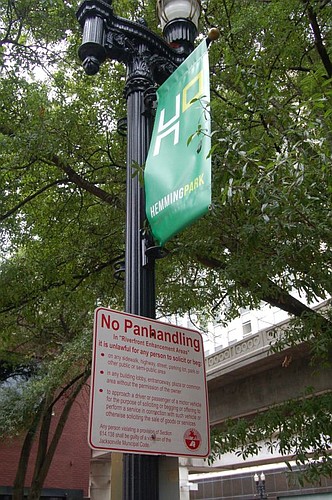
Brother, can you spare a dime?
That question — or one much like it — is commonly asked by people who say they are hungry or need money for some other reason.
The question is heard daily throughout the world, but panhandling is a subject that will be studied by Downtown Vision Inc., the urban core advocacy organization that oversees the 90-square-block improvement district.
Based on preliminary discussions with executives from social service agencies and the Jacksonville Sheriff’s Office, DVI CEO Jake Gordon said he’d like to see a strategy developed that could reduce the likelihood of panhandling by bringing together service providers, police and DVI.
“The goal is to make sure the Downtown partners are coordinated,” he said.
What keeps people away from the neighborhood will fall into one of two categories, said Gordon.
“When people say they can’t find a place to park Downtown, that’s a perception issue, because there are plenty of parking places. When people say it’s not safe, that’s a perception issue because it’s one of the safest parts of Jacksonville,” he said.
“But when people say they don’t like to come Downtown because they might be panhandled, that’s reality,” Gordon said.
Panhandling also is clearly against the law. It’s a misdemeanor and considered a nuisance crime.
Under city municipal code, “It shall be unlawful for any person within the Central Core Enhancement Area to solicit or beg on any sidewalk, highway, street, roadway, right-of-way, parking lot, park or picnic grounds or other public or semi-public area, or in any building lobby, entranceway, plaza or common area without the permission of the owner thereof.”
But the law is difficult to enforce.
Downtown Sgt. Rusty Bonifacio said in order for an officer to make an arrest for panhandling, the crime must be committed in the officer’s presence.
“And most people won’t break the law when a police officer is watching,” he said.
While many assume that those who ask other people for money are homeless, people who run social service agencies Downtown say that’s not necessarily so.
“Not all panhandlers are homeless and not all homeless people are panhandlers,” said Dawn Gilman, CEO of Changing Homelessness, formerly Emergency Services & Homeless Coalition of Northeast Florida.
However, “the lower the income level, the more common it is,” she said.
Asking for money Downtown to buy something to eat is not necessary, said Cindy Funkhouser, CEO of the Sulzbacher Center.
The center served more than 560,000 meals in 2014.
The nutritional programs at all of Downtown’s social service agencies provide more than 1 million meals annually to anyone who is hungry, she said.
Based on the preliminary discussion, Gordon said the key to reducing panhandling might be educating people that it’s not a good practice to hand over money to panhandlers.
“Make the decision before you leave home if you’re going to give. Otherwise, just say no,” Gilman said.
That might be a tough lesson for some people, but there are alternatives.
“If people feel so horrible about saying no to a person asking for money for food, they should offer to take that person to a sandwich shop and buy them something to eat,” said Funkhouser.
“Targeting the panhandlers doesn’t work. We have to work on reducing the supply of donors,” she said.
Gordon said he, like most people who work or visit Downtown, is panhandled on a regular basis. The next step is for the organization’s board to approve development of a plan. The proposal is scheduled on the agenda at the group’s meeting on Wednesday.
@drmaxdowntown
(904) 356-2466